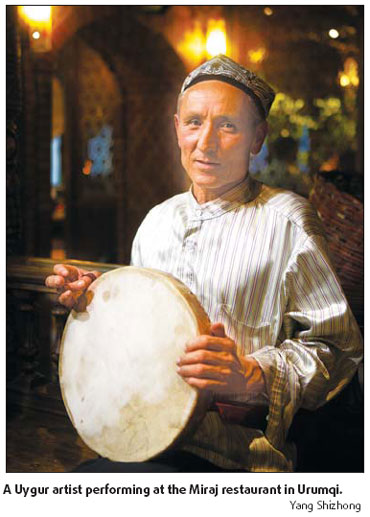
|
CHINA> Ethnic and Religious Affairs
 |
|
Ethnic food goes down a treat with Xinjiang entrepreneurs
By Zhu Linyong (China Daily)
Updated: 2009-05-15 09:11 Urumqi: How does a one-time primary school dropout get to be the general manager and proprietor of one of the most popular and upmarket restaurant chains in the Xinjiang Uygur Autonomous Region? Kerim Mamuti, a 57-year-old businessman based in Urumqi, the capital city of the region, considers the question briefly, before saying: "I got the two essential lessons of my life from my parents. The first is you must have the courage to face reality. The second is you must be hard-working and sharp at seizing opportunities."
 Mamuti has lived by these maxims for the whole of his life and abided by them whenever he had to face tough decisions. They have led him from early educational failure to being the owner of the Miraj chain of restaurants, which are regarded as among the best in the region. Mamuti was born in Atush, a barren land in the northwest Tarim Basin area of Xinjiang. Primarily an agricultural area with harsh natural surroundings, Atush is known for its high-quality cotton, grapes, and sheep but also for the business acumen of many of its residents - a heritage that Mamuti is proud to acknowledge. Prior to becoming a restaurateur, Mamuti was in the retail business. His business saw him trading more 120 different items of Chinese merchandise throughout Central Asia and the Arab world - but it was an experience he always found vaguely unsatisfying. He says: "I am always diligent, but I was dismayed by the fact that I had no control over future developments whilst doing international trade." This realization forced him to consider a drastic change in direction. Following a period of research and reflection, Mamuti believed he had found a niche in the market - high-end restaurants with a strong local and ethnic feel. Never a man for half measures, he invested more than 20 million yuan in his flagship Miraj restaurant and spent five years building it. Sun Shuangzhou, an engineer with Shenhua Xinjiang Thermal Power Plant and a frequent visitor to the Islamic-style Miraj, is just one of many who has been impressed by Mamuti's skills as a restaurateur. He says: "Treating visitors to dinner at Miraj has become a way of life for local people. It is one of the best restaurants in Urumqi. "The food is excellent, the decor is great and the floor shows by Kashgar farmers never fail to entertain. I've never brought anybody here who didn't enjoy it." Mamuti success story is not unique in the region, according to Parat Abdukadir, deputy general of Xinjiang's economic and trade commission: "There are now many sharp-eyed businessmen in Xinjiang, tapping into the goldmine that is ethnic food business. We have successfully adopted a number of preferential polices aimed at encouraging the growth of these large-scale ethnic restaurant chains. "A number of them have come to the fore since the mid-1990s and innovative marketing and positioning strategies have been the key to success for all of them." Abdukadir cites the success of Polat Hoxur, a former civil servant, who opened the first of his Mayflower Islamic Food Palaces in Urumqi in 2001. Hoxur opted for a much more low-key approach for the style of his restaurant's decor, in-house performances and even its cuisine. Whereas Miraj evokes the essence of traditional Uygur culture, the Mayflower is more of fusion of both the old and the new, the East and the West. It features both traditional Uygur paintings and more contemporary oil paintings with bright-colored decorations varying from room to room. All kinds of works from Hoxur's eclectic private art collection are exhibited in niches and recesses. Its cuisine, too, blends the old and the new - with sophisticated cocktails jostling for space on the menu, alongside some of the region's more traditional foods, such as Uygur-style noodles, fried rice, nang cakes, and kebabes. Hoxur remains confident that restaurants, such as his, will prove recession proof: "Establishments offering superb food, service and unusual eating experience, can withstand the fluctuation of the economy." Different again from both the Miraj and Mayflower restaurants is Su's Beef Noodles. Run by Ahmatjan Turgun, a former agriculturist, it offers Islamic fast foods for people in a hurry. In just under seven years, Turgun has managed to open more than 100 directly run fast food outlets across China. Turgun is clear as to his inspiration: "I am copying the business models of McDonalds and KFC, but I add Islamic food and culture into the mix." In Beijing alone, Turgun now has 12 branches, offering noodles and dishes designed to be suitable for the palates of Beijingers. He also now has a dedicated R&D center. |
主站蜘蛛池模板: 亚洲精品天堂在线观看 | 国产真实一区二区三区 | 被老外玩爽的中国美女视频 | 欧美一级片 在线播放 | 国产美女精品视频免费观看 | 成人网18免费网 | 国产精品久久毛片 | 日本在线视频免费看 | 久久久久久综合一区中文字幕 | 欧美一级鲁丝片免费看 | 欧美一区中文字幕 | 日韩在线视频不卡一区二区三区 | 日韩欧美一区二区中文字幕 | aa国产| 三级黄色免费网站 | 影音先锋色先锋女同另类 | 久久精品国产99国产精品 | 永久免费看毛片 | 亚洲日韩视频免费观看 | 国产精选莉莉私人影院 | 三级com | 国产成人免费a在线资源 | 亚洲欧美精选 | 18视频免费网址在线观看 | 亚洲男人的天堂在线视频 | 欧美成人免费在线视频 | 天堂在线视频网站 | 国产精品天天爽夜夜欢张柏芝 | 日韩在线免费视频 | 毛片免费观看的视频在线 | 国产成人午夜性a一级毛片 国产成人午夜性视频影院 国产成人香蕉久久久久 | 一级毛片无毒不卡直接观看 | 精品久久久久久综合网 | 一级做a爱久久久久久久 | 美女张开腿让人捅 | 国产性较精品视频免费 | 中文字幕在线视频在线看 | 亚洲日本一区二区三区在线 | 婷婷在线成人免费观看搜索 | 成人观看视频又黄又免费 | 亚洲欧美综合国产精品一区 |